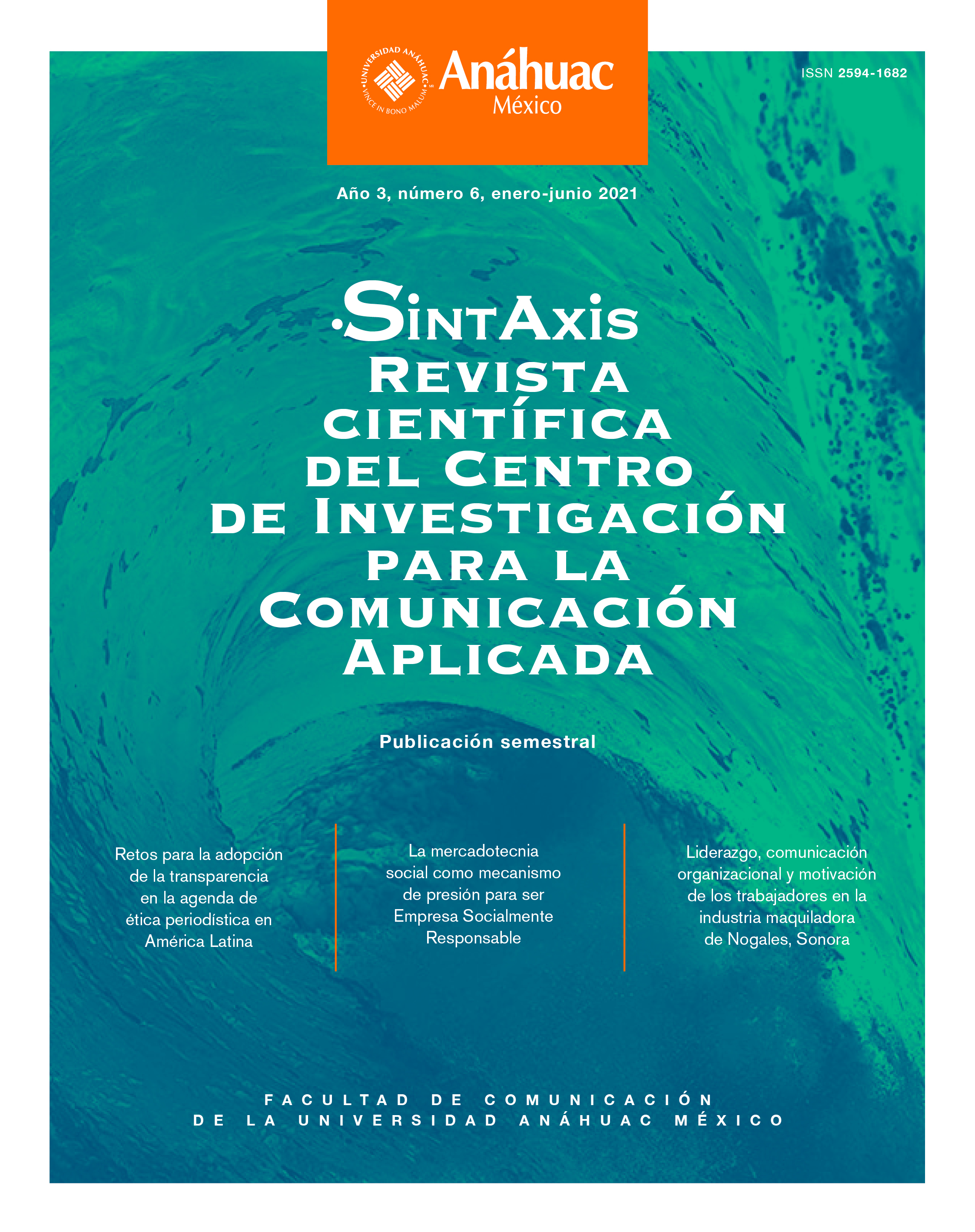Transformations and inertias in the levels of internal productive communication in Universities in the xxi century and the impact of accreditation processes on academics in Northwest Mexico, in the context of the pandemic
Main Article Content
Abstract
The article documents the articulation and investigation of four universes: internal communication, ethics, academics from public universities and the impact of accreditation models on them. The main interest was to explore the attitudes and reception of the practices of follow-up, encouragement and recognition of the communication of academic evaluations. Methodologically, exploratory work was carried out in a mixed way, a self-administered instrument and semi-structured interviews were applied to a sample of teachers assigned to the Communication Sciences educational program of a public university in Mexico. The results show, so far, that internal communication does not generate conditions of integration among teachers, does not coordinate the activities of teachers, perceiving in teachers a negative attitude towards accreditation processes, which was precipitated in the context of the pandemic. It works from the levels of productive communication.
Downloads
PLUMX Metrics
Article Details

This work is licensed under a Creative Commons Attribution-NonCommercial-NoDerivatives 4.0 International License.
The author keeps the property rights with no restriction whatsoever and guarantees the magazine the right to be the first publication of the work. The author is free to deposit the published version in any other medium, such as an institutional archive or on his own website.
References
Bonifaz, M. P. (2018). Recompensas económicas en la academia: análisis de literatura empírica sobre el pago por mérito en universidades de siete países. Educación, 27(52), 7–25. https://doi.org/10.18800/educacion.201801.001
Buendía, A., García, S., Grediaga, R., Landesmann, M., Rodríguez-Gómez, R., Rondero, N., Rueda, M., y Vera, H. (2017). Queríamos evaluar y terminamos contando: alternativas para la evaluación del trabajo académico. Perfiles Educativos, 39(157), 200-219. https://doi.org/10.22201/iisue.24486167e.2017.157.58464
Casanoves, J., Küster, I., y Vila Lpez, N. (2017). La importancia de percibir notoriedad e imagen de marca entre el personal de servicios de universidad. Cuadernos de Estudios Empresariales, 27(0), 65–86. https://doi.org/10.5209/CESE.57371
Castillo, G. (2004). El impacto de la evaluación externa en dos instituciones de educación superior en México: La Universidad Autónoma Metropolitana–Azcapotzalco y la Universidad Iberoamericana. Perfiles Latinoamericanos, 12(25), 115–148. http://www.scielo.org.mx/scielo.php?script=sci_arttext&pid=S0188-76532004000200005&lng=es&tlng=es
Constitución Política de los Estados Unidos Mexicanos (2020). http://www.diputados.gob.mx/LeyesBiblio/pdf/1_080520.pdf
Coser, L. A. (1978). Las instituciones voraces. México: Fondo de Cultura Económica.
Díaz-Campo, J., y Segado-Boj, F. (2017). Análisis de la investigación sobre ética de la comunicación en España (1980-2015). Estudios sobre el Mensaje Periodístico, 23(2), 759–772. https://doi.org/10.5209/ESMP.58014
Félix, A. (2014). La comunicación en las teorías de las organizaciones. El cruzar del siglo xx y la revolución de las nuevas tecnologías. Una visión histórica. Historia y Comunicación Social, 19, (Número Especial Febrero), 195–210. https://doi.org/10.5209/rev_HICS.2014.v19.45021
Fernández-Beltrán, F., García-Marzá, D., Sanahuja Sanahuja, R., Barberá Forcadell, S., & Andrés Martínez, A. (2017). La gestión de la comunicación para el impulso de la Investigación e Innovación Responsables: propuesta de protocolo desde la ética dialógica. Revista Latina de Comunicación Social, 72, 1040-1062. https://doi.org/10.4185/RLCS-2017-1207
Formanchuk, A. (2010). Comunicación interna 2.0: un desafío cultural. Ediciones Formanchuk y Asociados.
Gómez, P., y Rebeil. M.A. (2018). Comunicación integral para el desarrollo de una organización como comunidad adaptativa de participación. Universidad Anáhuac México. https://anahuac.primo.exlibrisgroup.com/discovery/delivery/52ANAHUAC_INST:52ANAHUAC/1283918190005016
Hernández-Díaz, A., Calderon-Abreu, T., Amador-Dumois, M., y Córdova-Claudio, M. (2017). Internal marketing and customer-contact employees’ attitudinal outcomes. Academia Revista Latinoamericana de Administración, 30(1), 124–143. https://doi.org/10.1108/ARLA-08-2015-0190
Nosnik, A. (2013). Teoría de la comunicación productiva: exploraciones más allá de la retroalimentación. Homo Sapiens.
Torres, C. A., y Schugurensky, D. (2001). La economía política de la educación superior en la era de la globalización neoliberal: América Latina desde una perspectiva comparatista. Perfiles Educativos, 23(92), 6–31. http://www.scielo.org.mx/scielo.php?script=sci_abstract&pid=S0185-26982001000200002&lng=es&nrm=iso
Vera, H., y González-Ledesma, M. A. (2018). Calidad y evaluación: matrimonio del cielo y el infierno. Perfiles Educativos, 40(Especial), 53–97. https://doi.org/10.22201/iisue.24486167e.2018.Especial.59180

